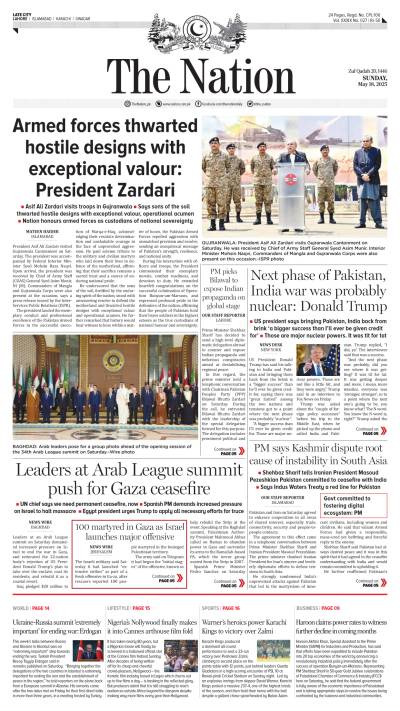The media reports reveal that the conduct of returning officers assigned with the task of scrutinising the nomination papers of prospective candidates are taking on a comic overtone. Most of the questions being asked by them on the basis of Articles 62 and 63 are not only ridiculous, but also hilarious.
Apparently, the criterion and minimum requirements for accessing the suitability of those who seek a seat in the legislative bodies is unclear. It also needs to be clarified on whose directions the returning officers are acting in this manner, especially when the Election Commission of Pakistan (ECP) maintains that it has not issued any directives in this regard.
The returning officers are educated judicial officers with ample experience; the trivia they are indulging in does not suit them. If they are acting on the advice of some quarters, then it implies that there is a deliberate effort to sabotage the elections.
Most of the candidates whose nomination papers were rejected have been members of the National and Provincial Assemblies. In Pakistan, politics, indeed, is a family business. Members of the same families and clans have moved in and out of the assemblies during successive civilian and military governments. Therefore, their acceptance or rejection should be based on their past conduct in office, which determines their suitability to represent people.
One is unlikely to disagree that the conditions of being sadiq (truthful) and ameen (trustworthy) are two important aspects that describe the character of a person; and the questions being asked by the officers about loan defaults and misappropriations of public funds are necessary to determine the credibility of a candidate.
However, asking him about who first landed on the moon seems ridiculous. It does not determine his character or suitability to become a legislator. How does failing to spell a word or describe the abbreviation of law degree disqualify a candidate?
The questions that have been asked from some candidates during the scrutiny process make one laugh. For instance, asking a lady candidate about how she will look after her children after the elections was uncalled for.
Previously, she had been a member of Punjab Assembly; if she could manage it then, it is obvious that she would be able to do it once again. Then asking an ex-Foreign Minister to produce her marriage certificate is grossly insulting.
Undoubtedly, the returning officers’ attitude is becoming “complicated and messy”, as one senior journalist describes it.
The ECP has denied giving any directions to the returning officers for scrutiny; if it has not, then it has failed in its duty. Indeed, providing guidelines to them for the discharge of their duties fall within the ECP’s responsibility; recently, it has issued belated directions (i.e. after the nomination papers of several candidates have been rejected) to the officers - that too, following the orders from the Lahore High Court.
Moreover, there are conflicting opinions; some allege that it is pre-poll engineering. This ambiguous process of scrutiny eliminates some of the candidates, who are likely to offer a tough competition. The tough attitude towards Nawaz Sharif and Imran Khan is cited as evidence to support this contention.
This also adds to the fact that there is a deliberate effort to postpone or delay the polls. A petition seeking its postponement for three weeks has already been submitted in the Lahore High Court. Perhaps, the delay is being sought to complete the scrutiny process, since there are more than 24,000 nomination papers that need to be examined.
Also, the turn of events is proving that Dr Tahirul Qadri’s demands are being accepted gradually. His principal demand at the Lahore Rally was the postponement of elections till the eligibility of prospective candidates was determined under Articles 62 and 63; in his demand, this delay was indefinite.
It is, however, surprising that all major political parties are not voicing any concern; they seem to be flowing with the tide. This has made the political game plan even more unpredictable.
The procedural mechanism within the ECP empowers it to effect the delay of one day at a time without assigning any limit. Thus, a combination of all available methods can delay the polls for a considerable period of time.
It is necessary that proper guidelines for the ECP and returning officers should be developed under which the scrutiny of candidates should progress. Left to their discretion, there is a possibility that irrelevant questions will keep emerging. In fact, this irrelevancy demonstrates the incompetency of the officials deputed for the task.
Elections demonstrate the people’s will in democracy and Pakistanis gave their verdict in two previous elections that were held after the end of General Ziaul Haq’s government - the author of Articles 62 and 63.
Even during those elections, the process of scrutiny did not assume this magnitude. So, there are apprehensions that there are some hidden objectives this time.
Having said that, the ECP has a great responsibility. It must act as the guardian of people’s political will. The rejection of nomination papers on charges of loan default, financial misappropriations and corruption stands to reason; those guilty of such crimes should be barred from representing people. But the trivial questions that are being asked from the candidates create doubts about the motives behind.
All efforts should concentrate on holding the elections on schedule. If some ineligibles get past the scrutiny, let the people eliminate them in the polls.
The writer is a retired brigadier. Email: arjerral@hotmail.com
Sunday, May 18, 2025
‘Not so divine’ comedy
-
Lahore emerges among safest global cities in Numbeo 2025 index
-
Lahore emerges among safest global cities in Numbeo 2025 index
-
India’s suspension of Indus Water Treaty legally baseless
-
Seventh polio case reported in Pakistan amid nationwide vaccination drive
-
Pakistan reports sixth polio case of 2025
-
PTA begins issuing VPN licences to regulate usage
Culture Shift
May 18, 2025
Tactical Shift
May 18, 2025
Unmasked Cruelty
May 18, 2025
India Isolated
May 17, 2025
Descent into Hell
May 17, 2025
Fostering Entrepreneurship
May 18, 2025
Behind a Promising Job Offer
May 18, 2025
Indo-Pak Wisdom
May 18, 2025
Traffic Signal at Shahzad Town
May 18, 2025
English a Measure of Intelligence?
May 17, 2025
ePaper - Nawaiwaqt
Nawaiwaqt Group | Copyright © 2025





